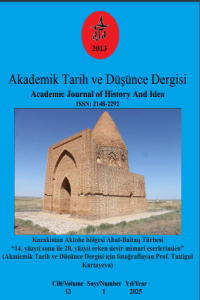Eğitim ve Pedagojide Ana Yön Olarak Mevlana Celaleddin Rumi (1207-1273)’nin Eserlerinde Ahlak Felsefesinin Kategorik Sistemi
Abstract
Bu makale, önde gelen ahlak şairi Mevlana Celaleddin Rumi'nin pedagojik fikirlerini tartışmaktadır. Mevlana'nın eserlerinin felsefe ve pedagojik düşünce tarihinde önemli bir yere sahip olduğu vurgulanmaktadır. İnsan yetiştirme, etkinlik, ahlak ve bireylerin toplumdaki rolü gibi konulara adanmış olan “Mesnevi ”si, hem halefleri hem de çağdaş gençler arasında en çok okunan ve kullanılan metinlerden biridir. Okuyucu, Mevlana'nın eserinde eğitim, hümanizm, olumlu ve olumsuz ahlaki nitelikler, özellikler, güzellik, merhamet, saygı ve etki gibi konuları kapsamlı bir şekilde araştırdığı konusunda bilgilendirilir. Bu konuları pedagojik-psikolojik, etnik-felsefi ve sosyo-politik perspektifleri birleştirerek kendine özgü dünya görüşüyle analiz etmiştir. Makale ayrıca ahlak kavramının sosyal, pedagojik ve psikolojik içeriğini açıklığa kavuşturmakta ve detaylandırmaktadır. Rumi'nin ahlaki görüşlerinin kategorik sistemini (doğruluk ve dürüstlük, cesaret ve dayanıklılık, sadelik ve alçakgönüllülük, dostluk ve yoldaşlık gibi ahlaki değerler ve nitelikler) tanımlar, ahlakın saflaştırılmasını analiz eder ve şairin pedagojik fikirlerini eğitim sürecinde kullanmanın bazı yollarını belirler.
Keywords
Mevlana Celaleddin Rumi İnsan Manevi Değerler ve Ahlaki Nitelikler Doğruluk ve Dürüstlük Cesaret ve Dirayet
References
- Isgandar, S. M., vd. (2024). On the history and role of education psychology in pedagogy: based on the example of Azerbaijan. Sep-oct, Revista Universidad Y Sociedad 16 (5), 303- 309.
- Kazımov, N. (2002). Məktəb pedqaqogikası. Çaşıoğlu. Çaşıoğlu nəşriyyatı.
- Mevlana Celaleddin Rumi. (2012). Məsnəvi. (C. I). (I və II dəftər). Əcəcmi Nəşəriyyat – Poliqrafiya Birliyi.
- Mevlana Celaleddin Rumi. (2013). Eşq pərvanəsi. Nurlan. Rüstəmov, F. (2002). Şərqdə pedaqogika tarixi. Nasir nəşriyyatı.
- Rüstəmova, A. (2005). Mövlana Cəlalədin Rumi. Elm nəşriyyatı.
- Sadiqov, F. & Həsənli, O. (2015). Tərbiətşünaslıq. Elm və təhsil nəşriyyatı.
- Subaşı, M. İ. (2007). Batıdaki Mevlana. Nesil.
The Categorical System of Moral Philosophy in the Works of Mevlana Jalaladdin Rumi (1207-1273) as the Main Direction in Education and Pedagogy
Abstract
This article discusses the pedagogical ideas of the prominent moral poet, Mevlana Jalaladdin Rumi. It highlights that Rumi’s work holds a significant place in the history of philosophy and pedagogical thought. His "Masnavi," dedicated to topics such as human upbringing, activity, morality, and the role of individuals in society, is one of the most widely read and utilized texts among both his successors and contemporary youth. The reader is informed that Rumi, in his work, extensively explored issues such as education, humanism, positive and negative moral qualities, characteristics, beauty, compassion, respect, and influence. He analyzed these subjects from his unique worldview, incorporating pedagogical-psychological, ethnic-philosophical, and socio-political perspectives. The article also clarifies and elaborates on the social, pedagogical, and psychological content of the concept of morality. It defines the categorical system of Rumi’s moral views (moral values and qualities such as truthfulness and honesty, courage and resilience, simplicity and humility, friendship and camaraderie, etc.), analyzes the purification of morality, and identifies some ways to use the poet’s pedagogical ideas in the education process.
Keywords
Mevlana Jalaladdin Rumi Human Spiritual Values and Moral Qualities Truthfulness and Honesty Courage and Resilience
References
- Isgandar, S. M., vd. (2024). On the history and role of education psychology in pedagogy: based on the example of Azerbaijan. Sep-oct, Revista Universidad Y Sociedad 16 (5), 303- 309.
- Kazımov, N. (2002). Məktəb pedqaqogikası. Çaşıoğlu. Çaşıoğlu nəşriyyatı.
- Mevlana Celaleddin Rumi. (2012). Məsnəvi. (C. I). (I və II dəftər). Əcəcmi Nəşəriyyat – Poliqrafiya Birliyi.
- Mevlana Celaleddin Rumi. (2013). Eşq pərvanəsi. Nurlan. Rüstəmov, F. (2002). Şərqdə pedaqogika tarixi. Nasir nəşriyyatı.
- Rüstəmova, A. (2005). Mövlana Cəlalədin Rumi. Elm nəşriyyatı.
- Sadiqov, F. & Həsənli, O. (2015). Tərbiətşünaslıq. Elm və təhsil nəşriyyatı.
- Subaşı, M. İ. (2007). Batıdaki Mevlana. Nesil.
Details
| Primary Language | English |
|---|---|
| Subjects | Information Systems Philosophy, Research Methods and Theory |
| Journal Section | Articles |
| Authors | |
| Early Pub Date | March 12, 2025 |
| Publication Date | |
| Submission Date | December 11, 2024 |
| Acceptance Date | February 18, 2025 |
| Published in Issue | Year 2025 Volume: 12 Issue: 1 |
По всем вопросам приема статей и выпуска очередных номеров обращаться в редакцию соответствующего журнала


